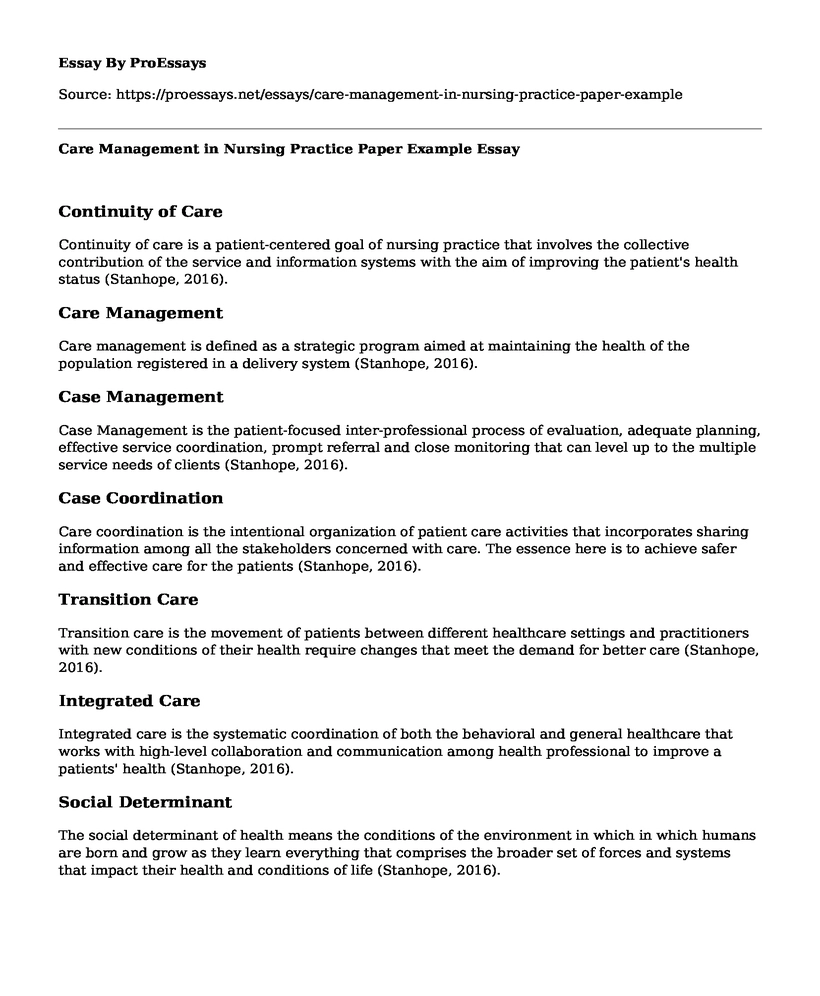Continuity of Care
Continuity of care is a patient-centered goal of nursing practice that involves the collective contribution of the service and information systems with the aim of improving the patient's health status (Stanhope, 2016).
Care Management
Care management is defined as a strategic program aimed at maintaining the health of the population registered in a delivery system (Stanhope, 2016).
Case Management
Case Management is the patient-focused inter-professional process of evaluation, adequate planning, effective service coordination, prompt referral and close monitoring that can level up to the multiple service needs of clients (Stanhope, 2016).
Case Coordination
Care coordination is the intentional organization of patient care activities that incorporates sharing information among all the stakeholders concerned with care. The essence here is to achieve safer and effective care for the patients (Stanhope, 2016).
Transition Care
Transition care is the movement of patients between different healthcare settings and practitioners with new conditions of their health require changes that meet the demand for better care (Stanhope, 2016).
Integrated Care
Integrated care is the systematic coordination of both the behavioral and general healthcare that works with high-level collaboration and communication among health professional to improve a patients' health (Stanhope, 2016).
Social Determinant
The social determinant of health means the conditions of the environment in which in which humans are born and grow as they learn everything that comprises the broader set of forces and systems that impact their health and conditions of life (Stanhope, 2016).
The scope of Practice, Roles, and Functions of a Case Manager
The scope of practice of a case manager is unlimited since their responsibility cuts across the whole health sector. The case manager is the broker for provider services, he or she is the client advocate, consultant, coordinator, educator, facilitator, liaison officer, mentor, reporter, negotiator, researcher and standardization monitor who doubles up as system allocator (Stanhope, 2016).
Compare and Contrast the Nursing Process with Processes of Case Management and Advocacy
Nurse case management process lays more emphasis on the care coordination, financial management and resource utilization that is geared to realize cost-effective results that centered on the welfare of the patient. Nurse case management is also extensively focused on patient safety and the provision of the least restrictive setting (Stanhope, 2016). On the contrary, the nursing process focuses on the quality of patient care in a manner that can make a speedy recovery journey. The nursing process is focused on assessments, diagnosis, planning, implementation of treatment, and evaluation of patient progress (Stanhope, 2016). The two processes share a common ground in the sense that they are interested in the general wellbeing and welfare of the client.
Methods to Manage Conflict and the Process of Achieving Collaboration
Conflict management begins with negotiation aiming to bring the aggrieved parties towards a favorable outcome. Accommodation of other people's concern is needed, and both parties must be willing to neglect personal concerns. Both parties must focus on getting a mutually acceptable solution that considers the concerns of the parties involved-this is called compromising (Stanhope, 2016). Individuals must also attempt to work collaboratively with others to solve issues that hamper harmonious interaction.
Collaboration is achievable if the parties involved decide to seek commitment to one another. The seven-tier process begins with creating awareness for the need to collaborate followed by a tentative exploration and mutual acknowledgment. Trust building is the third step in which people can rely on one another (Stanhope, 2016). Collegiality, which defines how different parties relate, is also important. Consensus building and commitment to the agreements are the last stages of initiating a joint synergic decision making that characterizes effective collaboration.
Legal and Ethical Issues that Confront Case Managers
Nursing practice involves myriad ethical obligations as defined in their Code of Ethics for Nursing. Any case of acting in contravention of the ethical obligations of nursing practice also has consequential legal implications attached. The ethical issues include beneficence that can be impaired if the nurse attention shifts from the patient's welfare to the cost of treatment of the patient (Stanhope, 2016). Fidelity rule requires the nurse to remain loyal to their client-nurse relationship. Veracity and non-maleficence are required of the nurse in whom there should be utmost honesty between them and the client.
Reference
Stanhope, M., Lancaster, J. (2016). Public Health Nursing: Population-Centered Health Care in the Community, 9th Edition. [VitalSource]. Retrieved from https://bookshelf.vitalsource.com/#/books/9780323321532/
Cite this page
Care Management in Nursing Practice Paper Example. (2022, Oct 06). Retrieved from https://proessays.net/essays/care-management-in-nursing-practice-paper-example
If you are the original author of this essay and no longer wish to have it published on the ProEssays website, please click below to request its removal:
- Essay Example on Causes and Effect of Attention Deficit Hyperactivity Disorder
- Paper Example on Effective Management in a Healthcare Setting
- How Leadership Gets Affected by the Presence of Different Cultures Paper Example
- Paper Example on Building Healthy Public Policy
- Reflection on Teamwork and Teambuilding Essay
- Leadership: Jack Ma Model of Ethical Leadership - Essay Sample
- Essay Example on Tobacco Smoking: A Global Threat & The Health Life Foundation's Response







